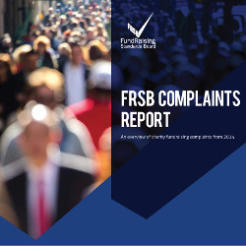Just 2 per cent of the FRSB's membership are responsible for 46 per cent of all fundraising complaints, according to the Fundraising Standards Board Complaints Report 2015, published today.
The report covers complaints about fundraising reported by more than nine in ten of the FRSB's members - 1,338 organisations. But just 2 per cent - around 26 organisations - accounted for 46 per cent of the 52,000 complaints.
At the same time 59 per cent of respondents - 793 organisations - reported no complaints at all.
The report found that major charities with incomes over £10m generated an average of 500 complaints each, and account for 77 per cent of complaints about direct marketing, and 84 per cent of complaints about public collections.
Health charities were by far the most complained about, accounting for 34 per cent of all complaints.
The FRSB’s complaints report analyses complaints data from 2014 alone, and therefore does not take into account recent controversy over fundraising practices that followed the death of 92-year-old poppy seller Olive Cooke. Despite this, the report said it “echoes recent public concerns about charity fundraising”.
Direct mail most complained about
Roughly 28,000 complaints - 54 per cent - were about direct marketing - which includes direct mail, telephone fundraising, email and SMS. Almost another 17,000 - 32 per cent - were about public collections - Direct Debit, cash, prospect and clothing/housing collections.
The most commplained about forms of fundraising were:
- Addressed direct mail, which received more than 16,500 complaints.
- Telephone fundraising, which received more than 8,000 complaints
- Doorstep face-to-face, which received more than 7,500 complaints.
- Clothing collections, which received almost 7,000 complaints.
Between them these four forms of fundraising made up more than three quarters of all complaints, but less than 2 per cent of all asks.
These four forms of fundraising have been the most complained about for the last several years.
Like-for-like complaints up 5 per cent
The report showed the number of complaints was up 8 per cent year-on-year. An analysis of charities which responded in 2013 and 2014 showed that complaints for these charities were up 5 per cent.
The number of charities responding to the report was up 11 per cent on the number who responded the previous year.
And the number of asks was up by 7 per cent to more than 20 billion. But of those asks, 19 billion came advertising, which prompted only 2 per cent of all complaints.
Just under half of the increase in total complaints came from charities that reported to the FRSB for the first time in 2014. These are excluded from like-for-like asks.
FRSB chair comments on report
Colin Lloyd, chair of the FRSB, said: “In light of concerns raised following the tragic death of Olive Cooke, the need to listen to donors and the wider public and to reflect that feedback within future fundraising planning has never been more evident.
“The common themes in complaint monitoring of a general dislike of some fundraising methods and the frequency of charity asks must be met with a true commitment by all practitioners to question the number of approaches they make and the ability with which they enable people to opt out of future contact.
“We welcome the initial steps that the Institute of Fundraising has recently announced to strengthen and review standards in these areas and we look forward to further progress over the coming weeks. “
Lloyd went on to say that the FRSB “recognises the immense challenges facing charities as they deal with continued Government cuts”. He said that there may be an “urgent need for cuts”, but there is also an “urgent need to ensure that public concerns are addressed and that a balance is struck that meets both the interests and of the donor and charity beneficiaries”.
Complaints processes
Complaints are resolved through the FRSB’s three stage process. Of the total 52,389 complaints, the majority were resolved by the charities concerned. Only 17 complaints were escalated to stage 2 of the FRSB’s complaints process for resolution, and then six of those were referred to the FRSB’s independent board for adjudication.
The report states that, at an organisational level, the large majority of complaints are driven by a relatively small number of major charities. It says the average number of complaints per charity is 39, with major charities averaging 500 complaints, and small and micro-organisations typically filing less than one.
Street fundraising
Street face-to-face fundraising received 865 complaints, for the 33,472,620 solicitations made in 2014.
Commenting on the report, Peter Hills-Jones, the chief executive of the Professional Fundraising Regulatory Association – which works with councils to manage street and doorstep 'face-to-face' fundraising, said: “I’m pleased that the proportion of street fundraising complaints continues to decline in comparison to activity and now accounts for only 2 per cent of all reported complaints. The PFRA’s successful policy of working with local authorities to agree proportionate levels of fundraising, and our robust compliance checks have played a significant role in reducing public concern.”
“Although door-to-door fundraising did see an increase in complaints of 8 per cent, our members have reported an overall increase in donors of 10 per cent to 688,035 donors. To put these numbers in perspective, it means that for every 90 people who signed up to support a great charitable cause, only one person complained. In total D2D has a complaint rate of just 0.0002 per cent, which is a great credit to our members.”








